#Napoleon x Murat
Text
Were you chillier than Naps on this Valentine's Day?
Happy (belated, I'm sorry I was so busy today) Valentine's Day to you all! 🩷
#napoleon bonaparte#french revolution#josephine#junot#murat#napoleon x junot#napoleon × desiree#clisson et eugénie#napoleon x murat#napoleon x josephine#i have crackships >.<#drama#love story#bonaparte
12 notes
·
View notes
Note
i feel bad for being secretly very into this but i keep thinking about napoleon/murat
I mean never feel bad for having a ship! These things are all done for fun and enjoyment, I don’t think anyone should feel bad about a crack ship or a crack ship that became serious (I’m guilty on multiple accounts of that), or just a ship you damn well like and everyone else can stuff themselves.
Napoleon/Murat has amazing drama and angst potential! Also very much aggravated ugggh it’s you-to-I do feel a little bad about your cheek getting shot but not bad enough to refrain from making mean jokes-to-?????? Guess we are shagging ??????
Napoleon secretly likes the leopard print and feathers. Murat *was* always trying to get Napoleon into tighter breeches under the pretense of “they’re more fashionable”. Clearly just wanted that imperial bum.
Also, considering in terms of personality, Napoleon and Caro were very similar, Murat clearly just wants someone to walk on him sexily while wearing 80% feathers and honestly? Good for him.
💖💖 live your napoleonic pairing truth! I support you in all you do!
19 notes
·
View notes
Text
shout-out to my fellow BessiMu shippers (I speak to a room of like 3 people or smth)
#I wish more people appreciated this ship#sob#THEY'RE SO CUTE PLEASE#it's about the himbo x serious but softspoken dynamic#Murat's been dragging Bessières around with him since they were like 14#napoleons marshals#napoleonic era#napoleonic#joachim murat#jean baptiste bessières
4 notes
·
View notes
Text
Since an introduction was made as well as the first series about Napoleonic era, I can continue posting mostly art with my heart and mind at ease. X)
So for the past year and a half I drew a bunch of stuff with Murat! Unfortunately, some of it doesn’t look good enough but I did my best to arrange a selection of my works that I still like nowadays.
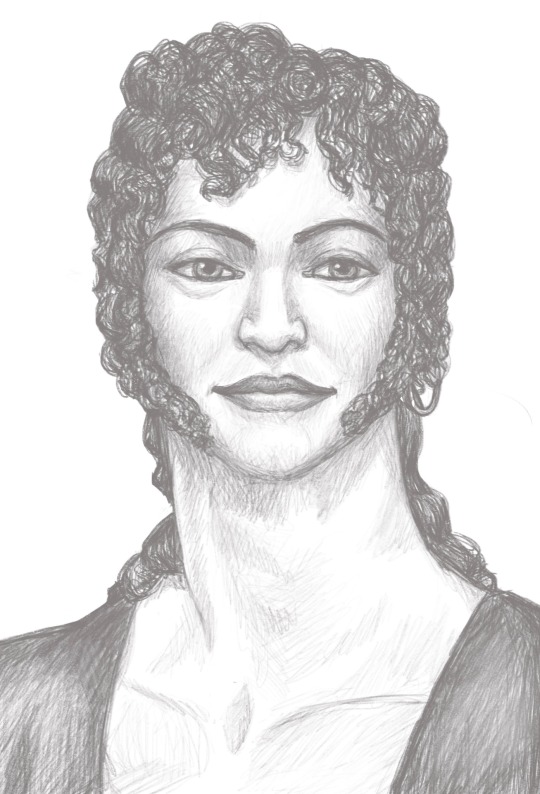
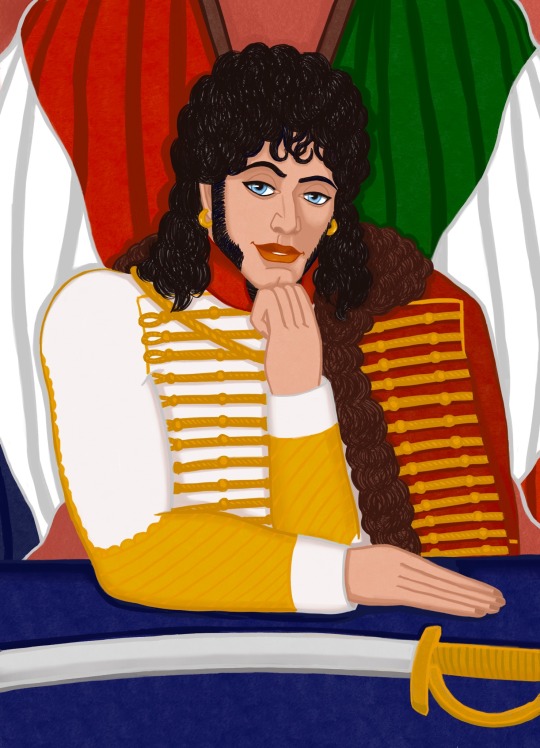

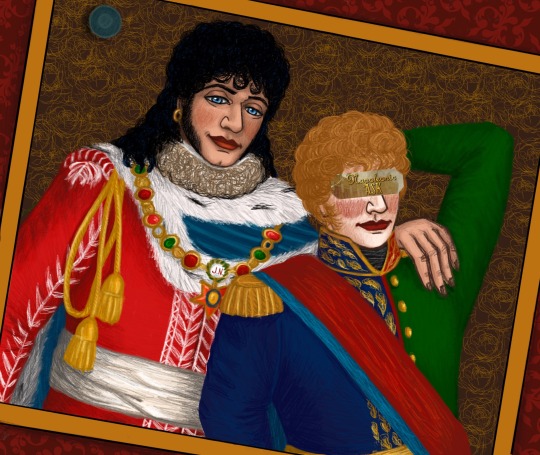

Here they are: a drawing study from the famous Canova’s bust (except for his moustache sorry Joachim I’m too weak…); cartoonish Murat with the flags of two countries which I associate with him the most; a bunch of ✨drama✨ concerning the 13th of October; small thing I made for a drawing ask in our Russian community of Napoleonic history lovers as well as teenager Joachim with his horse friend! 🐎
48 notes
·
View notes
Text
Marshal Brune and the Dumas Family (Part 2)
This post covers Brune’s relations with the Dumas family shortly before and after the Thomas-Alexandre Dumas’ death, though it has a wider focus. The general Dumas had been battling lingering illness as a result of being held captive in Brindisi, Naples from 1799 to 1801. During the last five years of his life, General Dumas attempted to secure the future of his family by asking for help from his comrades.
[My father] longed to see Brune and Murat; he hoped to obtain through their advocacy the indemnity due to him as one of the prisoners of Brindisi, and still further he hoped to obtain payment of his arrears of salary left over from the years VII and VIII.
Alexandre Dumas, My Memoirs, Vol. 1, Book 2, Ch. X, p. 221. Translated by E. M. Waller.
General Dumas Takes His Son to Meet Brune and Murat Before the Former’s Death
General Dumas would indeed see Brune and Murat in Paris, taking his son with him.
The next day Murat and Brune lunched with us. Luncheon was served in a room on the first floor; from the window of this room Montmartre could be seen, and I remember that I was watching a huge kite floating gracefully in the air above some windmills, when my father called me to him, put Brune's sword between my legs, Murat's hat on my head, and made me gallop round the table. "Do not ever forget, my child," he said to me, "how to-day you have ridden round that table on Brune's sword, and had Murat's hat on your head, [...]."
[...]
... my father knew he was a dying man. My father had tried to get an interview with the emperor,—for Bonaparte, the general of the Army of the Interior, had become the Emperor Napoleon,—and the emperor had declined to see my father. He had then fallen back on his two friends, Brune and Murat, who had just become marshals of the Empire. He found Brune as cordial as ever, but Murat very cool towards him. This luncheon was for the purpose of commending my mother and me to Brune and Murat; my mother, so soon to become a widow, and I an orphan; for, when my father died, his allowance would die with him, and we should be left without means.
They both promised to do all they could, should this come about.
My father embraced Brune, shook Murat by the hand and left Paris the next day with death both in his body and in his heart.
Alexandre Dumas, Vol. 1, Book 2, Ch. XI, My Memoirs, pp. 225-226. Translated by E. M. Waller.
Brune and the Dumas Family after the General Dumas’ Death
After Thomas-Alexandre Dumas’ death, Brune seems to have been the staunchest of his supporters. The Dumas memoirs detail how circumstances prevented his mother from obtaining his father's indemnity or his arrears, and some Marshals' reactions to her solicitations for help, including Brune.
There were arrears of salary due to my father, as I have said, arrears of 28,500 francs, for the years VII and VIII, but since our journey to Paris a law had been passed which declared that no arrears before the year IX should be paid.
As for the indemnity of 500,000 francs, due from the King of Naples for the French prisoners, which Bonaparte had exacted, nothing was heard of it, [...].
[...]
Murat and Brune then tried—Brune zealously, Murat half-heartedly—to keep the promise they had made to my father on our behalf. But it was quite useless. [...] my mother, the innocent victim of my father's Republican sentiments, could not obtain from the man who had offered to stand godfather to me before my birth the very smallest pension, although she was the widow of a general officer who had been chief-in-command of three armies.
Napoleon Bonaparte had apparently offered he and Josephine to be the godparents of General Dumas’ first son before the Egyptian campaign, though the promise fell through for various reasons. The Emperor would even clash over the question of the late Dumas’ payment with Brune, the real godfather:
Accordingly, my poor mother asked all my father's old friends, Brune, Murat, Augereau, Lannes, Jourdan, to endeavour to obtain a pension from the emperor. It was all in vain. [...] tired of hearing a name repeated so often which was already merely a dim recollection in his career, Napoleon angrily exclaimed to Brune, our warmest partisan:
"I forbid you ever to mention that fellow to me again."
The fact that Brune fell into disgrace around the same time that General Dumas died could have also contributed to his lack of success in obtaining what was owed (or perhaps his insistence on the subject contributed, however little, to his disgrace). Nevertheless, Dumas (père) seems to have retained positive memories of Brune. He shares his youthful thoughts on hearing Brune’s murder in 1815:
Alas! he was the only one of all my father's friends who had remained faithful to us! I vowed then that one day, when I grew up, I would go to Avignon, and in some way or other I would make his murderers pay for their crime.
He then claims that he visited Avignon and Pizzo, the sites of Brune and Murat’s deaths, later in life.
Remaining, uncited excerpts taken from Alexandre Dumas, My Memoirs, Vol. 1, Book 2, Ch. XII, pp. 237-238, p. 240, p. 249. Translated by E. M. Waller.
Link to a digital copy on Gutenberg.org.
21 notes
·
View notes
Photo
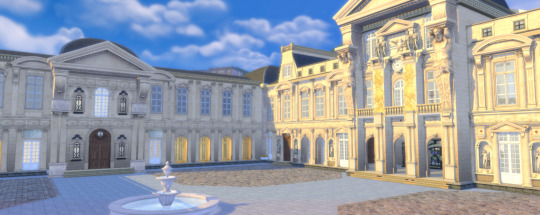
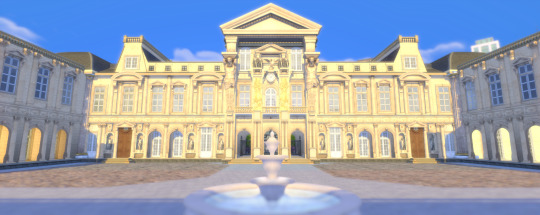

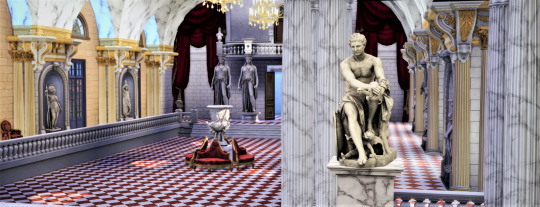
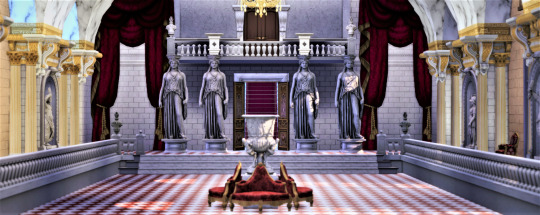
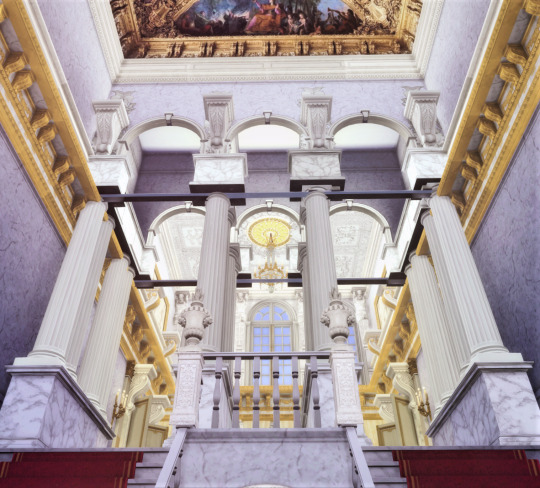
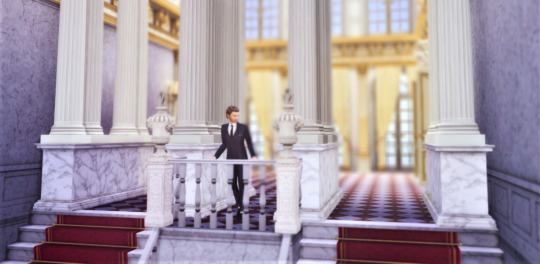
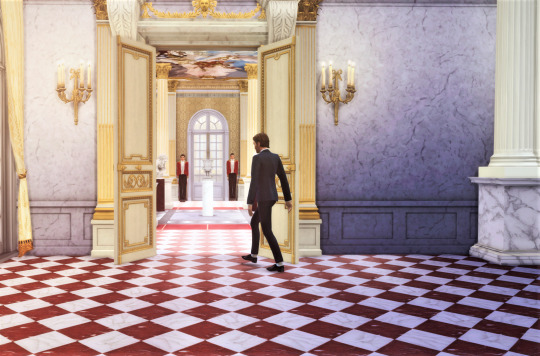
Visite aux Tuileries avec Stéphane Bernard (II, La cour carrée et l’aile Sully)
Visit to the Tuileries with Stéphane Bernard (Part 2)
Stéphane Bernard : "The square courtyard of the Louvre is the oldest part of the palace. After passing through the famous Caryatides Room, erected under the orders of King Henri II in the 16th century, we reach the Grand Staircase and the Hall of Columns"
“La cour carrée du Louvre est la plus ancienne partie du palais. Après avoir traversé la célèbre salle des Caryatides, érigée sous les ordres du roi Henri II au XVIe siècle, nous rejoignons le Grand Escalier et la salle des Colonnes.”
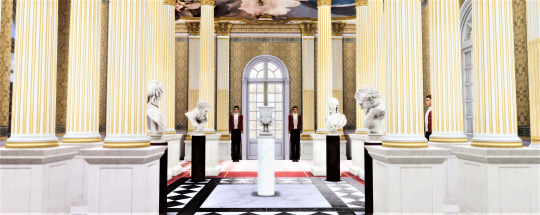
"The Hall of Columns was created in the 19th century, during the period of the Monarchical Restoration. It is a privileged exhibition space of the palace."
“La salle des Colonnes est créée au XIXe siècle, pendant la période de la Restauration monarchique. C’est un lieu d’exposition privilégié du palais.”
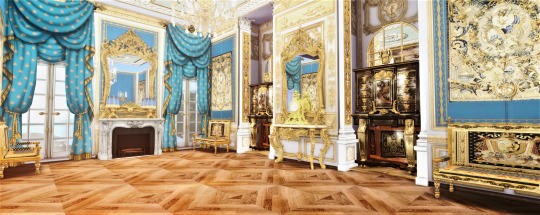
"In front is the Salon Bleu. Until a few years ago, it housed the art collections of the Louvre Museum. Today, it has become a privileged salon of the Emperor. The presence of the imperial coat of arms in the room bears witness to this".
“En face, se trouve le Salon Bleu. Il recevait il y a encore quelques années les collections d’objets d’arts du musée du Louvre. Aujourd’hui, c’est devenu un salon privilégié de l’Empereur. La présence des armes impériales dans la pièce en témoigne.”
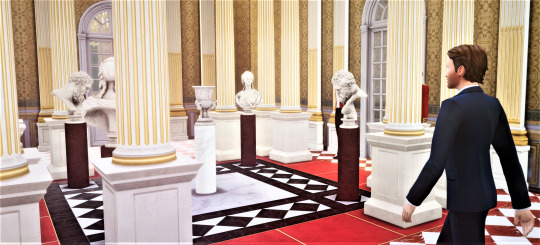
"But let's take the door on the right, which leads us to the Sully Wing. Duke Sully was a minister and friend of King Henri IV in the 16th century."
“Mais prenons la porte de droite, qui nous mène à l’aile Sully. Le duc Sully était un ministre et ami du bon roi Henri IV au XVIe siècle.”
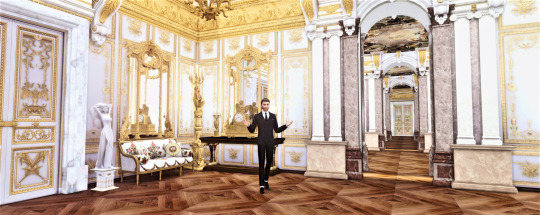
"This wing, formerly the Charles X museum, is now reserved for the collections of the ancient works of art of Emperor Napoleon IV."
“Cette aile, ancien musée Charles X, est désormais réservée aux collections des œuvres antiques de l’Empereur Napoléon IV.”
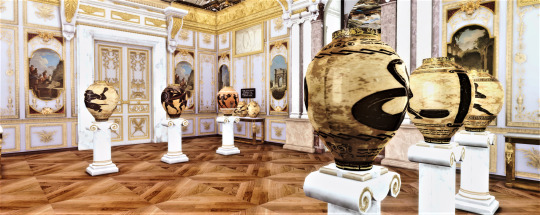
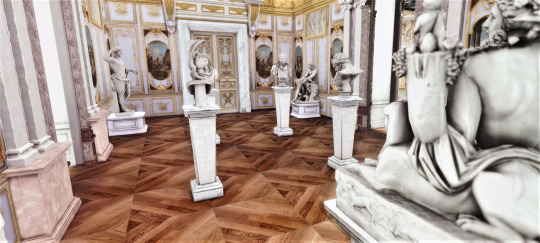
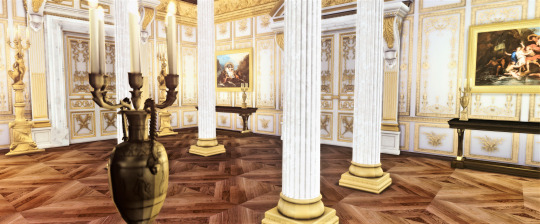
"At the end of the gallery is the Council of State Hall. The First Counsellor, Mr. Joachim Murat, is waiting for us."
“Au bout de la galerie, se trouve la Salle du Conseil d’Etat. Le Premier Conseiller, M. Joachim Murat, nous attend.”
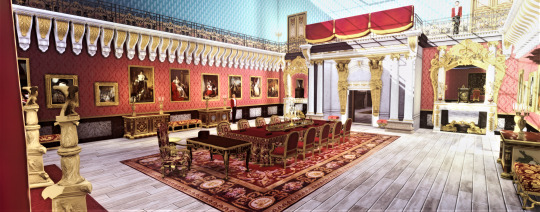
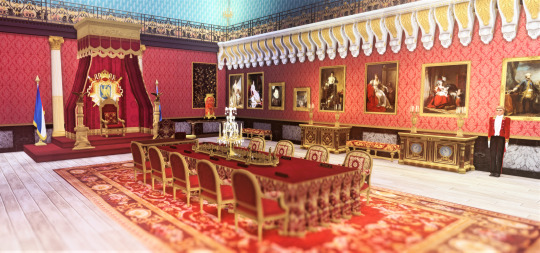
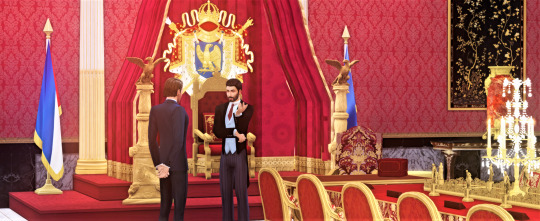
J. Murat : "The Council meets here every month in order to give the Emperor certain opinions concerning the laws and administration of Francesim. Numerous rooms in the Louvre, called the Palais-Royal, allow us to carry out our missions of advising the imperial family and the government."
“Le Conseil se réunit ici tous les mois afin de prodiguer à l’Empereur certains avis concernant les lois et l’administration de la Francesim. De nombreuses salles du Louvre, appelées le Palais-Royal, nous permettent de mener nos missions de conseil de la famille impériale et du gouvernement.”
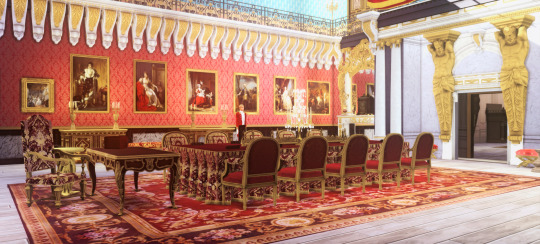
"The Council of State deals with and judges all the administrative affairs of the Empire. As Francesim's first civil servant, it is my duty to represent the public authorities and imperial officials before the Emperor."
“Le Conseil d’Etat s’occupe et juge de toutes les affaires administratives de l’Empire. En tant que Premier fonctionnaire de Francesim, mon devoir est de représenter auprès de l’Empereur les pouvoirs publics et fonctionnaires impériaux.”
S. Bernard : "This room was the former Napoleon III museum. The next room was the home section of the Council of State, wasn't it?"
“Cette salle était l’ancien musée Napoléon III. La salle suivante accueille la section de l’Intérieur du Conseil d’Etat, n’est-ce pas ?”
J. Murat : "Absolutely, the Hall of Seven Fireplaces has been refurbished."
“Absolument, la Salle des Sept Cheminées a été réaménagée.”
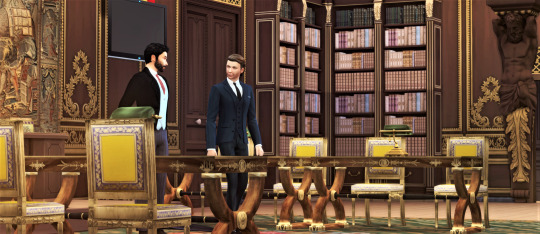
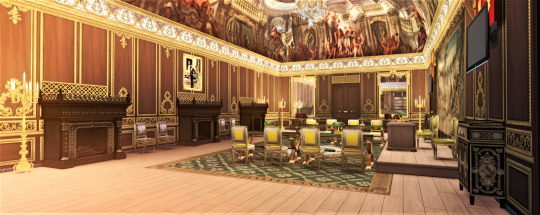
79 notes
·
View notes
Photo
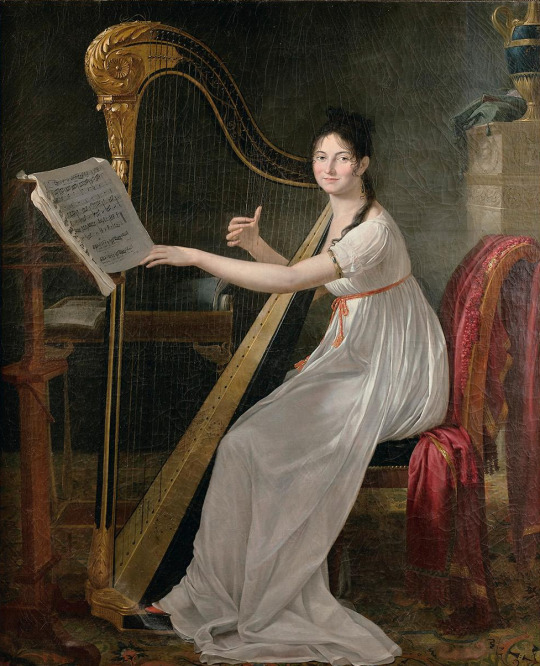
Marie Antoinette Adèle Duchatel, née Papin, by Lethière
I've recently been reminded of a story that I never had paid much attention to as I did not consider it very credible. But as Michel Kerautret repeats it in his biography of Eugène de Beauharnais, maybe there is more truth to it than I thought.
It's told by Madame Rémusat in her memoirs, and it's about yet another of Napoleon's many infidelities, this time with a Madame Duchatel (to whom Madame Rémusat mysteriously refers as "Madame X"). The story has all the usual components (suspicious Josephine - intrigues by Caroline and Joachim Murat, the latter of whom pretends to be interested in the lady himself in order to get Josephine off the scent - scruples by the Rémusats who do not know how to react but want to support Josephine - Duroc acting as go-between - more intrigues and so on) but with an extra twist: This time, Eugène is also interested in the lady. As a matter of fact, he had been interested in her first.
In short: Roughly around the time of the coronation, at the end of 1804, Eugène falls head over heels in love with that lady (as he usually does) and begs his mum to give her a job at the new imperial court. Josephine complies, of course - everything for her darling son! Madame Duchatel, however, immediately ditches Eugène for Napoleon as soon as the emperor himself starts to show an interest in her. Caroline and Joachim Murat for a while manage to pretend that it's Murat who has won the lady's favour. In any case: bummer. Eugène is heartbroken but, according to Madame de Rémusat, acts in a very dignified manner (for a 23-year-old anyway). But possibly through Madame Duchatel herself, Napoleon learns of Eugène's feelings and reacts rather brutally: by ordering Eugène to immediately part with his "chasseurs" for Milan (February 1805).
Now, I'm not sure why Napoleon would feel the need to remove Eugène from court like that if Eugène really had given up on the lady, and if the lady did not show any interest in Eugène in return. But that's the story. It is true that Eugène's departure from Paris seems to have been rather abrupt, and considering that he was to prepare the Italian coronation that would only take place in May, it's also somewhat early. Plus, Hortense in a letter to her brother does indeed refer to that lady
18 July 1805, Saint-Amand
I have just received your letter, my dear Eugène; I promise you that my greatest pleasure will be to write to you; I am at the moment far from the Court and not very familiar with what is happening there. So I can only tell you about last winter. You never knew the sorrows I experienced in all sorts of ways; I was saving all that for your return, but, as my life at Saint-Amand is very monotonous, I will tell you all the little court intrigues of last winter.
You knew all those of Mme. Duchâtel, but what you don't know is that she went, some time ago, to lunch with Mme. Murat, that she said she was very unhappy, that the Empress had done her a great deal of harm, that she would rather have her resignation; but what distressed her very much was that the Empress had told her. How dangerous a wicked woman is! She might well have been the Emperor's mistress. No one would have minded; so much the worse for her! But to try to upset everyone is something I do not forgive her! I, who never meddle in anything, seeing the grief that all the reports gave to Mama and the Emperor, thought I could speak to General Duroc. I told him that he should rather seek to appease the Emperor, that it was to make him unhappy to tell him that the Empress spoke to everyone; as I had spent some time chatting with him in front of Murat, he went to tell him what we were discussing. Murat came to find me and said to me that we were mistaken about the people who embittered the Emperor, that he sought to soothe him. I thought that his conversation would go no further. It did not. The next day, the Emperor knew about it. He told me that I too was against him: I told him quite frankly what had made me talk to these gentlemen. Duroc told me that it was Murat who had said it to the Emperor, and Murat, who has since had a fine explanation with me, told me that it was not him and that it was Duroc. Who is to be believed in all this? No one, and one should never get involved in court intrigues.
Hortense, never getting involved in anything as usual. At least she does not seem to imply Eugène had any interest in the lady himself; actually, she rather makes it sound as if Josephine nand Hortense had believed Madame Duchatel to be Napoleon's mistress, but without reason.
However, there are also some cryptic, tongue-in-cheek remarks by Murat in his letters to Eugène during spring and summer 1805 (in their endless discussion about who had to congratulate whom or had to inform whom about wanting to be congratulated first), about how "a beautiful woman never needed a recommandation" when dealing with Eugène. Maybe he is indeed referring to this rather complicated love (or not) affair?
#napoleon#napoleon's court#napoleon's family#joachim murat#caroline murat#eugene de beauharnais#hortense de beauharnais#adele duchatel
12 notes
·
View notes
Text
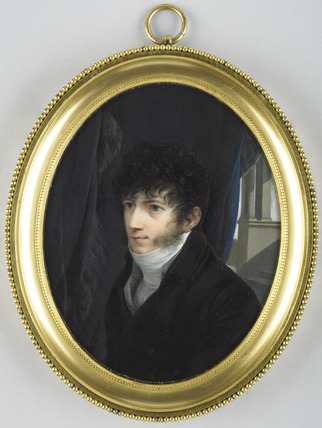
Jean-Baptiste Isabey, born on 11 April 1767, was one of the most celebrated and prolific artists of his time. Having studied under the renowned Jacques-Louis David, over the course of his career he painted official portraits and miniatures (his specialty) for the courts of Louis XVI, Napoleon, and Louis XVIII. It was during the Directory period that he became acquainted with Napoleon and Josephine, who quickly took a liking to him; the latter soon appointed him as drawing master for her children, Eugène and Hortense (he would also later be appointed drawing teacher to Napoleon’s second wife, Marie-Louise). Isabey also helped plan the coronation ceremonies of both Napoleon and Charles X, and was awarded the Legion of Honor in 1825. In 1837 he was appointed Deputy Curator of the Royal Museums by Louis-Philippe. He died in Paris on 18 April 1855.
Some examples of Isabey’s works:
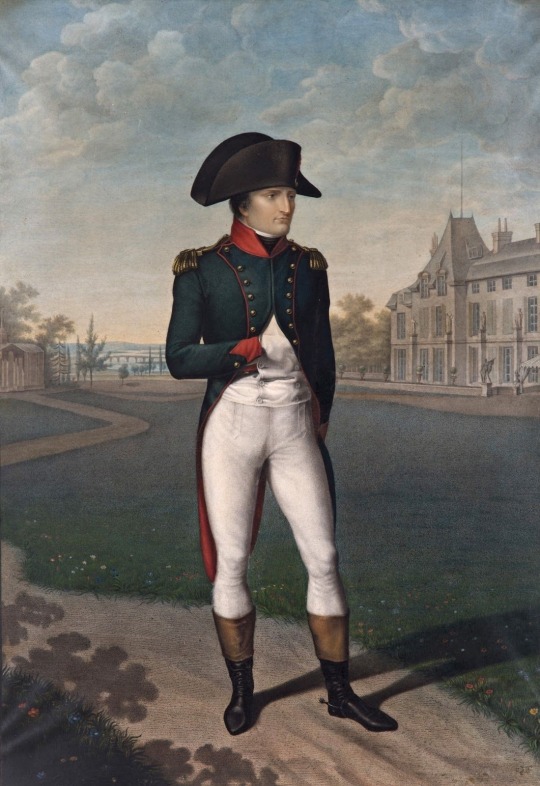
Napoleon at Malmaison, perhaps Isabey’s single most famous painting.
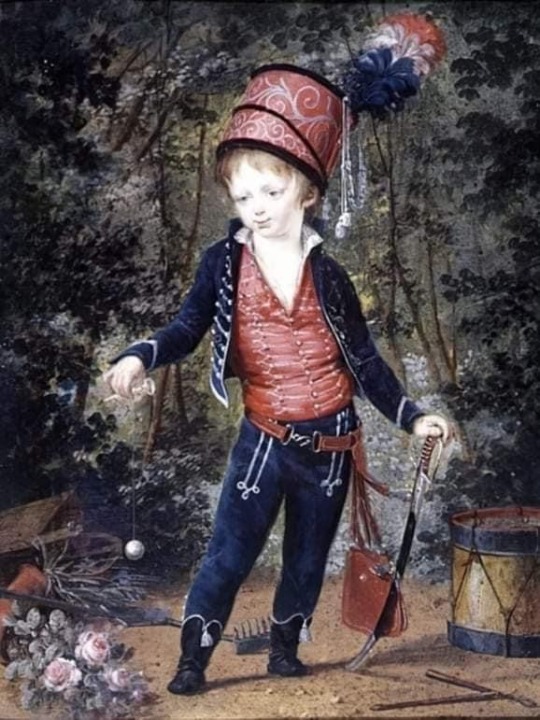

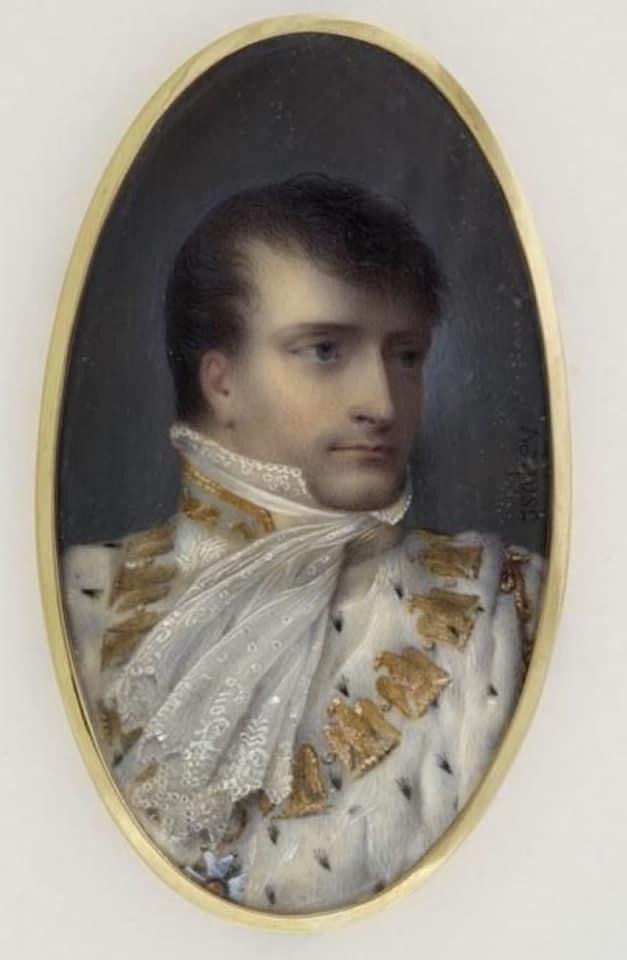
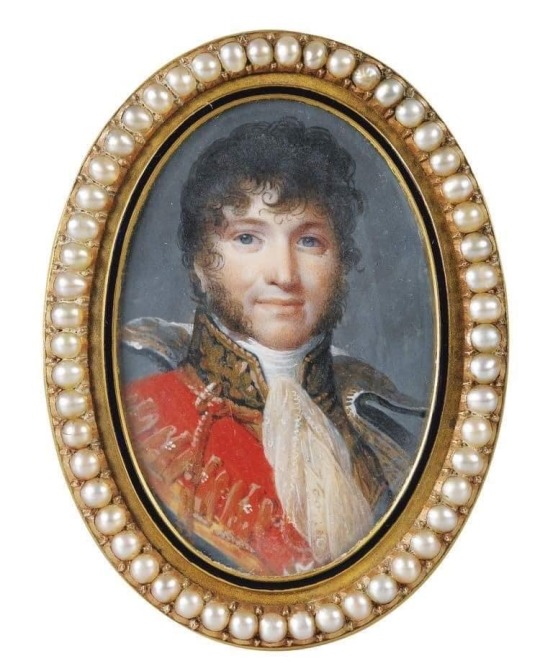
The King of Rome, Josephine, Napoleon, and Joachim Murat.
#today in history#Jean-Baptiste Isabey#art#artists#Napoleon Bonaparte#Josephine de Beauharnais#history
18 notes
·
View notes
Photo
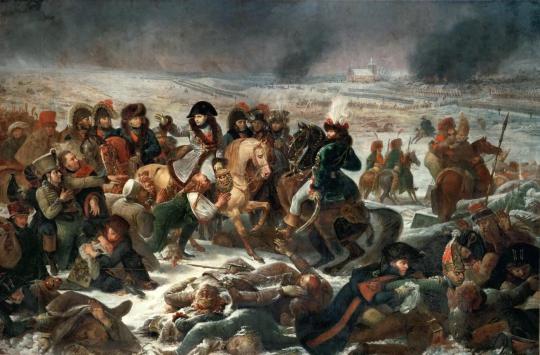
MWW Artwork of the Day (2/7/20)
Antoine-Jean Gros (French, 1771-1835)
Napoleon Bonaparte on the Battlefield of Eylau, 1807 (1808)
Oil on canvas, 521 x 784 cm.
Musée du Louvre, Paris
The battle of Eylau (8 February 1807) in Poland, in which the Russian army was defeated by the French during the fourth coalition, was an extremely bloody engagement, resulting in 25,000 dead and wounded. In this picture, the Emperor, advancing towards the right, is mounted on a light bay horse, and surrounded by his staff; the cloak and hat which he wore at Eylau were handed to Gros, who kept them till his death. Napoleon is speaking to a wounded Lithuanian, who is moved by the humanity of the victor, and is credited with saying: 'Caesar has granted me life; I will serve you faithfully, as I have served Alexander.' Opposite Napoleon, on a prancing charger, is Murat, whose epic charges transformed an undecided battle into victory; between Murat and Napoleon can be seen Marshal Berthier, Marshal Bessières and General Caulaincourt; the young Lithuanian soldier who stretches his arms towards Napoleon is supported by Baron Percy, Surgeon-in-Chief to the Grande Armée.
In this work, Gros has entirely forsaken classical composition; he has grouped his figures in masses and put striking close-ups of bleeding corpses in the foreground. Although he had never been far east, he has successfully rendered the melancholy of the great wintry plain, the sky leaden with smoke from the burning village.
8 notes
·
View notes
Note
murat bent over in his tightest pair of breeches, definitely not sticking his ass out
murat: oh i didnt hear you come in napoleon
napoleon: get out of my room
He just wanted to point something out to Napoleon on his map and uh, um, if he could just reach over and show the emperor—sorry sorry, didn’t mean to bump my arse against you like that—
Napoleon: get outta here
Murat: wait sire I have news about the bottom rung of the opposing army—
Napoleon: try harder. Or don’t, as the case may be.
Murat: well I should think you should listen to me, I was up at the cock’s crow for you.
Napoleon: get out.
#I don’t know why Murat and Eomer and Downey all bring out the worst puns in me but they do#no one else does#it’s cause they’re chaotic dumb dumbs and I love them#they all have Dad Energy but it’s different kinds of dad energy#anyway#Napoleon Bonaparte#joachim murat#Napoleon x Murat
15 notes
·
View notes
Photo

Quiz: One week to try an identification! To discover the period, the model and the Military Unit to which this flag was granted by official decree... Then I will tell you its amazing story ... and its surprising rediscovery after an enigmatic disappearance ... which almost made it deleted of the history and of major European conflicts. It mesures 90 cm x 90 cm without his silver fringes. You can ask questions that I will answer just by yes or no. See you next week, on Sunday 24, for the first episode of a surprising story of discovery and identification after x years of disappearance. Good research :-) #1erempire #bonaparte #napoleon #napoleonbonaparte #napoleonic #napoleonicwars #napoleonicwars #souvenirnapoleonien #battleofwaterloo #1stempire #lagrandearmee #waterlooplein #waterloo #waterlooregion #fermedhougoumont #fermedemontsaintjean #battleofwagram #battleoffriedland #gardeimperiale #battleofausterlitz #centjours #murat #campagnederussie https://www.instagram.com/p/BvEtON2HtTK/?utm_source=ig_tumblr_share&igshid=1fi94qz1twfup
#1erempire#bonaparte#napoleon#napoleonbonaparte#napoleonic#napoleonicwars#souvenirnapoleonien#battleofwaterloo#1stempire#lagrandearmee#waterlooplein#waterloo#waterlooregion#fermedhougoumont#fermedemontsaintjean#battleofwagram#battleoffriedland#gardeimperiale#battleofausterlitz#centjours#murat#campagnederussie
0 notes
Text
Breguet Reine de Naples Moon 8908BR Rose Gold tại Baselworld 2018
Breguet Reine de Naples Moon 8908BR Rose Gold được giới thiệu tại triển lãm đồng hồ Baselworld 2018, với thiết kế ấn tượng khi được thiêm tính năng hiển thị phức tạp khi tích hợp lịch tuần trăng và bộ hiển thị kim xăng.
Mẫu đồng hồ Breguet Reine de Naples 8908 được thiết kế dành riêng cho phái nữ, là một chiếc đồng hồ tự động, sở hữu bộ vỏ từ vàng hồng cùng kim cương, đi kèm mặt số khảm trai, bên trên được tích hợp thêm Lịch tuần trăng và bộ hiển thị năng lượng
Đầu năm nay, Breguet đã nhận định rằng đồng hồ nữ chiếm 40% doanh thu của hãng, đồng thời mẫu đồng hồ nằm trong danh mục best-seller của hãng năm 2017 là Reine de Naples ref 8918. Quả trứng vàng Reine de Naples đích thực là một mẫu đồng hồ có trong hình dạng một quả trứng, được điểm xuyết với vô vàn đá quý xung quanh được Breguet giới thiệu lần đầu vào năm 2002.
Tích hợp lịch tuần trăng và bộ hiển thị năng lương
Tái xuất trong năm nay, phiên bản mới nhất của dòng Reine de Naples mang mã hiệu ref. 8908. Mẫu đồng hồ này được thiết kế dành riêng cho phái nữ, là một chiếc đồng hồ tự động, sở hữu bộ vỏ từ vàng hồng cùng kim cương, đi kèm mặt số khảm trai, bên trên được tích hợp thêm Lịch tuần trăng và bộ hiển thị năng lượng.
Từ thuở ban đầu, người sáng lập thương hiệu Abraham-Louis Breguet đã luôn đeo đuổi cung cách lễ nghi của giới quý tộc và hoàng gia Pháp, đồng thời những khách hàng của ông trải dài từ Nữ hoàng Marie Antoinette, Hoàng hậu Josephine, em gái đức vua Napoleon Bonaparte – Carolone Murat và cả Nữ hoàng xứ Naples.
Nổi tiếng là nhà sản xuất đồng hồ dẫn đầu trong giới chế tác với vô số mẫu đồng hồ phức tạp mọi thời đại, những khách hàng của Breguet luôn mong muốn sở hữu những cỗ máy thời thượng bậc nhất, và Caroline Mura cũng không phải là ngoại lệ.
Được biết, mẫu đồng hồ 1812 có dáng chữ nhật, đi kèm dây đeo xinh xắn được Breguet thiết kế cho Nữ hoàng xứ Naples. Để rồi, lấy nguồn cảm hứng từ những ghi chép lại trong bảo tàng Breguet tại Vendôme, thương hiệu đã giới thiệu đến công chúng bộ sưu tập Reine de Naples trong năm 2002, với kiểu dáng đặc biệt: hình quả trứng.
Thiết kế đặc biệt
Mẫu đồng hồ của Caroline Murat vốn là một cỗ máy thời gian phức tạp, được tích hợp khá nhiều chức năng: cơ chế điểm chuông, bộ hiển thị nhanh/chậm, một thang đo nhiệt độ cùng với mặt số guilloche được chế tác thủ công. Mẫu đồng hồ Reine de Naples ref. 8908 còn đặc biệt hơn, với góp mặt của Lịch tuần trăng, bộ hiển thị thời gian cùng một mặt số bạc guilloche,… tất cả đều mang dấu ấn Breguet.
Reine de Naples 8908 sở hữu bộ vỏ khung vàng dạng quả trứng có kích thước 36,5mm x 28,54mm (nếu xét trong cả bộ sưu tập thì ref. 8908 có kích thương trung bình). Vành bezel vẫn được chia rãnh quen thuộc như nhiều cỗ máy Breguet khác. Không dừng ở đó, bên trên vành bezel là 128 viên kim cương tròn, đem đến cái nhìn trang nhã lấp lánh. Giống như những mẫu đồng hồ khác trong cả bộ sưu tập, bên trên núm chỉnh giờ của Reine de Naples 8908 là một viên đá hồng ngọc bên trên cùng với bộ phận nối với dây đeo dáng tròn đặt tại góc 6 giờ.
Khi đặt chiếc đồng hồ ref. 8908 tại khu vực có ánh sáng khác nhau, mặt số khảm trai Tahitian có thể chuyển sắc từ màu vàng Champagne sang màu nâu ấm áp. Đặt tại góc 12 giờ là bộ hiển thị Lịch tuần trăng cùng kim xanh lướt nhẹ để báo hiệu thời lượng cót còn lại.
Toàn bộ kim giờ và phút màu xanh đều hiện lên với phong cách rất Breguet, rất cổ điển. Tất cả hòa mình vào mặt số phụ được hoàn thiện bởi những đường vân guilloche tinh tế vốn được thực hiện trên tấm khung vàng và mạ bạc bên trên.
Tưởng chừng là dòng chữ nguệch ngoạc, không có ý nghĩa gì, nhưng thực tế, tại góc từ 11 giờ đến 1 giờ trên mặt số phụ chính là dấu ấn riêng của thương hiệu Breguet đặt trên mỗi một cỗ máy thời gian của hãng. Kỹ hiệu này bắt đầu được sử dụng từ năm 1795, với mục đích đánh lừa mắt thường, nhưng thực tế lại chính là điểm đem đến giá trị cho mỗi chiếc đồng hồ.
Bộ máy in-house caliber 537
Bên trong của cỗ máy Breguet Reine de Naples ref. 8908 là bộ máy tự động được sản xuất in-house caliber 537. Bộ máy này có khả năng dự trữ năng lượng trong vòng 45 giờ đồng hồ, đi kèm tần số 3,5 Hz. Lớp kính sapphire cao cấp trang bị phía nắp lưng là một cơ hội tuyệt vời cho bất kỳ ai muốn chiêm ngưỡng bộ máy tròn với sự có mặt của bánh xe Breguet, dây tóc bằng silicon. Trên mỗi bộ máy của dòng đồng hồ Reine de Naples đều được đánh số cùng chữ kỹ quen thuộc.
Đi cùng dây deo da và khóa gập nạm kim cương, mẫu đồng hồ Breguet Reine de Naples ref. 8908 có mức giá 35.200 Euro hoặc có mức giá 60.600 Euro dây đeo vàng hồng.
Xem bài viết gốc tại: Breguet Reine de Naples Moon 8908BR Rose Gold tại Baselworld 2018
0 notes
Note
napoleon fandom (or what there is of it) needs more marshal x marshal ships
hahaha ~~~fAnDoM~~~ I remember there being drama like six or seven years ago over people referring to it as such, which is neither here nor there. Just so much hot air blown over something that doesn't matter lol
Anyway, I support this! I feel like Davout is prime for some Peak Angst given the antagonism between him and everyone. Pure enemy-???-lovers? energy here. Especially Davout/Berthier or Davout/Murat. Thiébault was just a little bitch [affectionate].
Duroc: we have to go stop another duel.
Napoleon: AnOtHeR oNe?? Davout, why is all of Paris and her mother trying to duel you?
Davout: no comment, sire.
Murat: He started it, I swear.
Berthier: I can't believe I'm here and ready to fight but I am.
Thiébault: I call first dibs.
Napoleon: sweet baby jesus preserve me from my marshals
18 notes
·
View notes
Note
you posted it a thousand years ago but that one modern au napolington was great. there was one just one thing i cant get out of my mind though. murat and arthur. how exactly would that go?? i want them being forced to go on a wine run or something and being in a car by themselves
oh the modern au where they fight over the plane seat? That's a classic.
Murat and Arthur would be hilarious. Murat's at the wheel and they're in Corsica visiting the in-laws and Murat's just taking hair pin turns like a demon as they drive down to Ajaccio to do a big shop for everyone and Arthur is having heart attacks. Multiple ones. Messages Napoleon 'If I don't make it back alive I want you to have my book collection.' Napoleon replies, 'Calm down, Joachim's not that bad.' Arthur is like, 'True, you're worse.' (
I feel like Arthur would have to try and keep Murat on track because he'd get sidetracked on other quests. So they're there to get like wine, bread, cheese, pork, and these seven vegetables that Letizia needs but Murat is like 'We can also get these other fifty items' and Arthur is like 'We don't need flaming hot cheetoh mac n' cheese' and Murat is like, 'But I want to know what the Americans are up to now with their insane food products. Plus, the kids will love it.'
Arthur squints, is fairly certain Murat isn't really buying this for the kids. Arthur isn't wrong. When it comes out of the shopping bag Napoleon is like, 'That looks radioactive. Arthur you were supposed to curb this sort of purchasing behaviour.'
Arthur wants to drive back when they're done at the Spar or wherever it is they end up stopping at. Murat is like 'No, you drive slower than my granny. '
In general, I think they'd be polite around each other and wouldn't get into fights or anything. They're just very different people. I don't see them being besties. The only time they're super friendly/brotherly is when Murat ropes Arthur into some insane game or prank, because Arthur had a bit of a prankster streak in him that would come out from time to time which Murat would capitalize on. When they start spending time together everyone begins holding their collective breath for whatever shenanigans are about to unfold.
Caroline is like, 'This is Arthur's fault. The Englishman is a bad influence. Trust Nabulio to bring in the trouble maker.' And Napoleon is like, 'E x C u S e M e. You married a man who is 80% feathers and leopard print.' Caro replies, 'You say that like it's a bad thing.'
I can see Arthur not getting on with Jerome because he would be like 'your brother is making STUPID decisions over and over again' and Napoleon is like, 'Yeah...that's Jerome for you.' It drives Arthur absolutely nuts because it's so frustrating.
#also we all know Napoleon would drive like a MANIAC#he'd never follow the speed limit and would go so fast on the autoban he would actually get pulled over and the german police would be like#'congratulations you've been ticketed for driving too fast in the country with the road made for driving too fast.'#Napoleon would keep it as a souvenir#Arthur thought trains in the 19th c went too fast this is not a man who would be equipped for Napoleon's approach to speed#but I would tag Napoleon as a bit of an adrenalin junkie#ask#reply#napolington#napoleon bonaparte#arthur wellesley
15 notes
·
View notes
Text
Letters from Naples. 1813
All these letters are still from the first half of the year, before Murat (for the last time) joined forces with Napoleon in August 1813. Most of them are only postscripts to “official letters” (which were likely to be opened and read by secret police), some even using an extra secret cipher not used on other occasions, if only to give you this special “007″-feeling.
Translated again from “Helfert, Joachim Murat”.
Mier to Metternich [French, in ciphers].
Naples 16 March 1813.
My Lord Count!
The sort of mystery put from the beginning into the sending of Prince Cariati to Vienna, and the rumours which circulate in the public on the object of his mission, can only cause offence to the French government and will necessarily increase the bad blood of the Emperor Napoleon towards the King, which is already sufficiently pronounced without it. Since his arrival in Naples the king has not received a word from the Emperor; the queen has had two letters, but she thought she had to conceal them from her husband because of their content. The Duke of Berthier told the king at the moment of his leaving the army to return to Naples, that he believed him to be too good a Frenchman not to be sure that he would willingly sacrifice his crown if the interests of France required it. This statement, which the King supposes to have been ordered by the Emperor to prepare him for what he must expect, has increased his distrust and anxiety for the preservation of his kingdom. Knowing the King's character, I fear that this will lead him to some step contrary to his position and his true interests, and will give France a pretext of necessity for the realisation of a project which perhaps for the moment should not yet be put into execution. The departure of the Queen would be in this respect a real calamity for this country, because she prevents by her wise and reasoned advice, and her pleas, many steps dictated by the first movement of the King's hot temper, and which would end up by completely dividing him from the Emperor. At first, on his return, he intended to summon the Estates or Deputies of the kingdom and have himself crowned of the Two Sicilies; it was only by dint of persuasion and entreaties that the Queen succeeded in turning him away from this project.
Accept etc
Mier
Prince Cariati was Murat’s special envoy sent to Vienna to start negotiations with Austria, apparently behind Caroline’s back.
Metternich to Mier [French, concept; original in ciphers].
Vienna, 20 April 1813. By Neopolitan courier.
Prince Cariati has acquitted himself to me of the commission he is charged with. He told me that the King desired only the preservation of the throne of Naples; that he would renounce his claims to Sicily and was not aiming at any acquisitions; convinced, however, that his existence would sooner or later be threatened by the great preponderance of France, and knowing the liberal views of our august master, H. M. wished to have a guarantee which would ensure his future existence; that this guarantee could only be given to him by Austria, and that the king was ready, on the other hand, to support our approach, if necessary, by all his military forces.
I answered Prince Cariati that the policy of the Emperor did not require to be commented on, that it was sufficiently known in Europe to be generally appreciated at its just value. That we desired only a state of peace deserving of the name; that far from any excess in our designs, and not subjecting the good to the prospects of an often illusory better, we had succeeded in winning the confidence of all the great powers to the point of seeing them, France not excepted, solicit us to change the subordinate attitude of a merely intervening power into that of mediator. That consequently His Imperial Majesty was assembling great military forces to support his words of peace and to bring them to a successful conclusion; but that the mediating Power had no longer any choice; that he could only hope to succeed in so far as he was actually prepared to support his words by war.
As Prince Cariati kept repeating to me that this was undoubtedly the King's way of judging these questions, and that His Majesty had only the most pronounced desire to prove to us that he would be able to uphold, against all odds, the commitments which he had made, I asked him if he had sufficiently precise instructions to enter into a real negotiation with us and full powers to complete it. He replied that he did not; that he felt that full powers were necessary for our own safety, but that as for the instructions I could be assured that the King's views were invariable, and that those which His Majesty had expressed to him at the time of his departure from Naples were confined to the widest possible latitude.
The present courier (an officer of the guards who accompanied Prince Cariati here) is sent by him in secret to Naples. He asks for full powers. You will not have, Count, to meddle in the substance of an affair which is very delicate in itself, and you will keep strictly to the terms of my answer to Prince Cariati above, without taking a step to engage the King to send the document requested by his envoy. You will add, however, that the Emperor nourishes particular feelings of esteem for the King; that His Majesty's policy is entirely conservative, and that he only wishes to see the King rule the people who have devoted all their attachment to him, and that His Majesty is very sensitive to the marks of confidence which this Prince gives him. You can be sure that no evidence of this feeling has ever caused regret to any power.
As Prince Cariati is making his report to the Duke of Gallo, you can speak to him about the present communication, and you will testify to him with the confidence which we personally have in him the conviction that, if we are ready to listen to the King, it is up to him to provide his Envoy with all diplomatic guarantees.
You will also satisfy yourselves that by virtue of the present instructions you have little to add to what I have lately prescribed to you.
If I’m not mistaken the “Duc de Gallo” was minister of foreign affairs in Naples. His ... ability to adapt to several consecutive goverments at odds with each other would later result in a rather awkward situation for him: He refused to go to Vienna for the Congress of 1814 because there he would have met his ex-queen, Maria Carolina of Habsburg.
Mier to Metternich [French, in special ciphers, "très sécrèt"].
Naples this 27 April 1813.
On the return of the King I will carry out your orders, I distrust the minister too much to speak to him about it. He is persuaded of the forthcoming reunion of this country with the great Empire, and always thinking more of his own interests than those of his country and his sovereign, he does everything possible to win the goodwill of the new French government in advance and thereby secure lucrative positions for himself under the new reign. He is known as such from the past and his present conduct has not earned him an appreciation. X. also advised me not to confide in him too much.
I have the honour to be ut in litteris
Mier.
Yes. “X.” would mean “Joachim”. We have literally reached the level of a Bond movie now.
Mier to Metternich [French, in particular ciphers, "très sécrèt"].
this 30 April 1813.
We have consulted with X. about what to say to his wife. I will always keep strictly to your orders, but do not let me miss your instructions. X. requests your friendly advice on what he should say, do, ask, stipulate, promising to follow your advice in everything. All that is required is the preservation of the present fortune and independence.
I have the honour etc.
The book’s author adds a footnote here with an interesting remark:
In Nicomede Bianchi "Storia docum. della Diplomazia europea in Italia I" p. 2 we find the assertion that Metternich had already made contact with Caroline Murat in Paris, and that he had succeeded in turning her away from her imperial brother; Caroline had thus become "nelle mani del principe di Metternich il migliore instrumento per sospingere il re di Napoli a passare nel campo de' nemici della sua patria e del suo benefattore".... Since the "X" of the despatches I reproduced can only refer to King Joachim, and "sa femme" is therefore Caroline Murat, who at that time cannot yet have been fully aware of the contacts with the Viennese Cabinet, this results in the opposite of Bianchi's assertion, which, incidentally, would also be in irresolvable contradiction with other facts and circumstances.
My personal footnote to the above letter: May I find it a little piquant to see Murat ask Metternich for advice on how to break the news to Caroline? “Dear Metternich, as you have slept with my wife, how do you think I should got about this?”
Mier to Metternich [French, in ciphers, postscript 1].
Naples 29 June 1813
My Lord Count!
The article of the Moniteur relating to the isle of Ponza has enraged the King, to the point of making him ill. He has sent Mr. Durand, Minister of France, a very strong note on this subject which states, among other things, that this is the second time that the French gazettes have taken it upon themselves to insult him, and that at the third such article he would respond by dismissing the Minister of France from his State.
The Emperor Napoleon intends to ask the King of Naples again for 20,000 men.
His Majesty gave a negative answer, declaring that not a company of his army would leave the kingdom unless commanded by him in person.
All these measures of the Emperor persuade the King more and more that Emperor Napoleon nurses hostile designs against him and that he would have already put them into execution if he were not too busy on another side. Not omitting any occasion to humiliate him, doing everything to finally weary his patience he has the air of provoking him and finding a pretext of his annihilation in the resistance to his will.
The King sets himself up for any event, and I am convinced that only one Senatus Consult is needed to deprive him of his kingdom.
I have the honour to be ut in litteris
Once more we have Murat getting ill when under stress or in great emotional turmoil. And this time, Mier even has an extra secret postscript to the secret postscript:
Mier to Metternich [French, in special ciphers, 'très sécrèt', postcript 2]
this 29th June 1813.
Napoleon has had the Queen informed that war with Austria was inevitable; that he needed troops; that consequently she should engage the King to place 20,000 men at the disposal of the Viceroy of Italy. Their Majesties await with impatience the answer to Cariati's proposals in order to know the course to be followed in the event of war between Austria and France. The King is still determined to support our interests
Please give me your instructions on the conduct I should follow in the event of war with France
I have the honour etc.
If this is true, if it really was already known in Naples by the end of June that Napoleon wanted war with Austria (which means that Napoleon must have been decided already at the beginning of the armistice and a long time before his meeting with Metternich in Dresden), this is diametrically opposed to the claim of Napoleon-friendly historians, who tend to accuse the allies of not having been sincere in their peace proposals in mid-1813. And it makes me feel like crying, considering how many people at this point put all their hopes in Napoleon making peace. Which he apparently never even seriously considered.
19 notes
·
View notes
Photo

MWW Artwork of the Day (8/29/19)
Jean-Auguste-Dominique Ingres (French, 1780-1867)
The Grand Odalisque (1814)
Oil on canvas, 91 x 162 cm.
Musée du Louvre, Paris
The effects in Ingres' paintings largely depend on drawing and linearity, but he also used color to supremely calculated effect. The cold turquoise of the silk curtain with its decoration of red flowers intensified the warm flesh tone of the Grande Odalisque. This nude was painted in 1814 for Napoleon's sister, Queen Caroline Murat. Unlike the realism of Goya's Maja, Ingres' nude is hardly intimate, the eroticism here emerging slowly from the reserve and the questioning, assessing glance of the naked woman. This is a tradition that goes back to Giorgione and Titian, but Ingres has painted a living woman and not an allegory of Venus. Nevertheless, the realistic intimacy is lessened by setting the scene in the distant world of the Orient.
0 notes